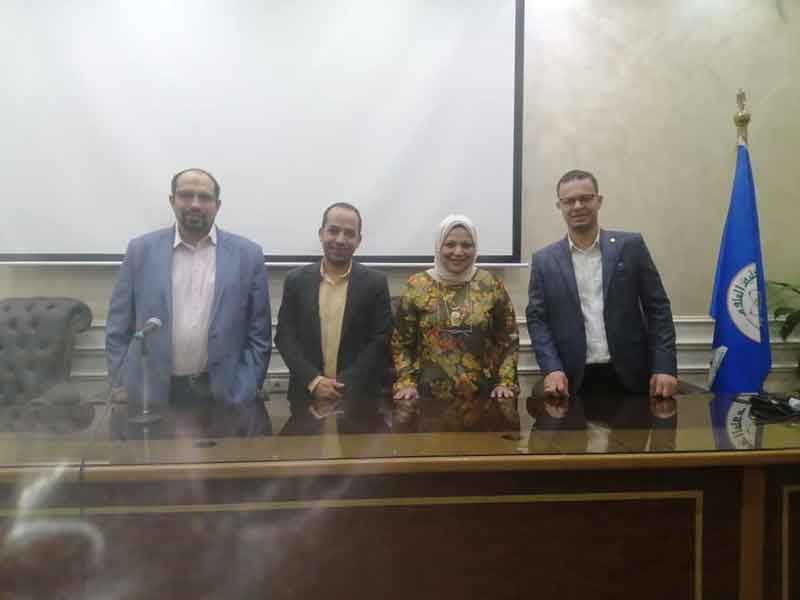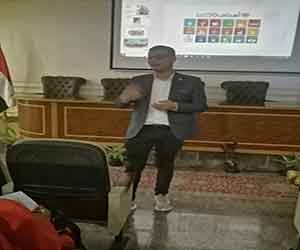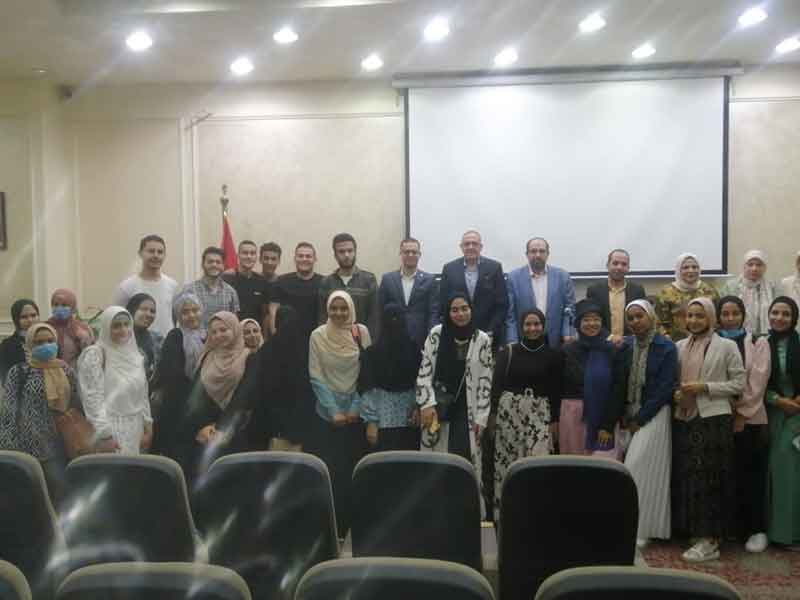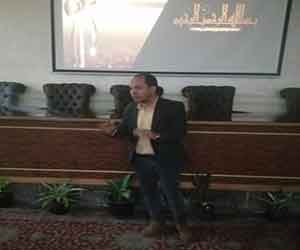
A seminar at the Faculty of Science, Ain Shams University, discusses the role of the faculty in preserving the environment
In the framework of the celebration of the World Earth Day at Ain Shams University under the auspices of Prof. Dr. Mahmoud El-Metini, President of the University, and Prof. Dr. Hisham Temraz, Vice President of Community Service and Environmental Development Affairs, the Community Service and Environmental Development Affairs Sector at the Faculty of Science at Ain Shams University, under the auspices of Prof. Dr. Mohamed Rajaa El-Sutohi, Dean of the Faculty, headed by Prof. Dr. Amani Suleiman, Vice Dean of Community Service and Environmental Development, organized a seminar entitled "Activating the Faculty's Role in Preserving the Environment".
Prof. Dr. Abdul Rahman Badr Al-Din, Professor of Biochemistry, Dr. Ahmed Hashem, Assistant Professor, Department of Botany, and Dr. Islam Saad Adly, teacher, Department of Entomology, gave a lecture at the seminar.
The seminar discussed several environmental issues, including the importance of preserving the environment in light of climate changes, rationalizing electricity and water consumption, and combating smoking.
A video was shown showing the damage of the various industrial sectors on the planet, which take place over large periods of time, the film also dealt with the damage of plastic to wildlife and climatic changes, it reflects the challenges facing the earth and affecting water and food in the future.
 |
 |
 |
||
During the seminar, Prof. Dr. Abdel Rahman Badr El-Din, a professor in the Department of Biochemistry, reviewed the concept of "sustainable development" and how smoking affects sustainable development by destroying public health and reducing public productivity, he also touched on the measures taken by Egypt to reduce smoking within government and educational institutions, encouraging students to make a difference by directing smokers, advising them to stay away from this destructive habit and to follow deterrent laws to prevent smoking and its spread among social groups.
For his part, Dr. Ahmed Hashem, the assistant professor in the Department of Botany, explained what is meant by climate change and that it is that change in the factors and climatic conditions that results continuously, and despite the constant warnings from scientists that we expect our coasts to sink in Alexandria as a result of climatic changes, it did not affect the general trend to preserve the environment, which necessitated actions international political parties.
He also explained the phenomenon of global warming, which generates global warming and results in an imbalance and increase in greenhouse gases, including methane dioxide, nitrous oxide, and hydro-chloro-fluoro-carbons, which trap heat in the earth and cause global warming that may produce many changes in the planet's climate and change the form of life on its surface.
In his speech, he referred to the multiple causes of global warming, including excessive cutting of forests, drying up of wetlands, and increasing the burning of fossil fuels.
Dr. Ahmed Hashem, reviewed the rates of temperature increases from before the industrial revolution until now, explaining the phenomenon of melting ice in Greenland in the Arctic, which predicts the sinking of the coasts in the Delta and Alexandria.
He reviewed the scenarios showing the effects of temperature increases, climatic changes, changing rain patterns, droughts, forest fires and changing seasons of animal migration.
He referred to the precautions and steps taken by Egypt to control changes in the provision of renewable energy sources of electricity such as solar energy, wind energy, nuclear energy, water energy, the establishment of the largest wind power station to generate electricity from wind in Jabal El-Zeit, the establishment of seawater desalination projects, and the Umm Al-Buhairat or "Lake Manzala" development project.
Dr. slam Adly, a teacher in the Department of Entomology, stressed during his speech during the seminar that human looks at the momentary benefit from their surrounding environment, indifferent to the future effects of their wrong use of this environment, as there are many wells and beaches that have become unsuitable for human use, and malignant diseases have become more prevalent, this indicates that the human being pays the price for the pollution of the environment and the change of the natural system.
Dr. Islam reviewed how Egypt helped preserve the environment and the role of the Faculty of Science, Ain Shams University in raising awareness, he addressed the role of youth in protecting the environment and rationalizing energy consumption in various sectors to rationalize water in agriculture, adding that faculty's student should be a role model for the community and be an ambassador for his faculty and university outside its walls.
.svg)



